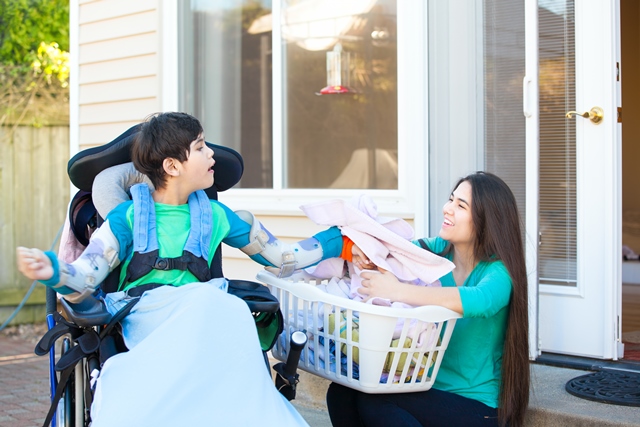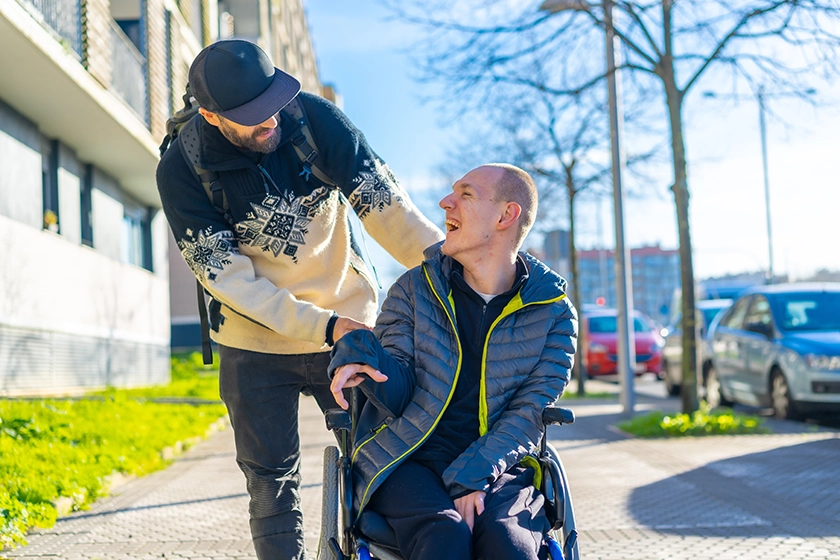Office of Integrated Health
What We Do

Mission: Supporting this life of possibilities by ensuring quality supports and a pathway to community integrated health services.To serve as a resource for information related to healthcare, wellness, healthcare providers, and health related services within the Commonwealth.
Since the opening of the first institution for “epileptics and the feeble minded”, Virginians involved in the care of persons with developmental disabilities (DD) have identified the gaps in services, living situation concerns, health care access issues, and even the terminology used to describe people with DD. There have been attempts over the years to effect change and improve access, but many were done at a regional level and failed to achieve widespread and lasting results.
The Office of Integrated Health (OIH) was established by the Department of Behavioral Health and Developmental Services (DBHDS) in response to these needs. Its purpose is to build and improve on those past efforts and find new, innovative ways to effect change, and decrease inter and intradepartmental barriers across agencies. Consistent with the strategic goals of DBHDS the OIH assesses the needs and resources available for providing needed health services and supports to persons with DD and serious mental illness (SMI) throughout the Commonwealth. The OIH currently oversees and is responsible for the Health Support Network, and Long Term Care Services:
PASRR,OBRA, and the clinical operations of Hiram W. Davis Medical Center.
Test 1
Health and Safety Alerts
2025 Alerts
- Part 1: Seizure Disorder and Epilepsy Basics with Quiz – January 2025
2024 Alerts
- Respiratory Syncytial Virus (RSV) with Quiz – January 2024
- COVID-19 Overview – January 2024
- Vital Signs – February 2024
- Healthcare Advocacy – March 2024
- Skin Integrity & Pressure Injury – April 2024
- Intellectual & Developmental Disabilities – May 2024
- Medical Emergency Drills with checklists – July 2024
- Recognizing Pain – August 2024
- Common Medical Emergencies with Scenarios – August 2024
- Dehydration with Quiz – September 2024
- Dental with Quiz – November 2024
2023 Alerts
- Respiratory Infections Overview – January 2023
- Annual Healthcare Visits – February 2023
- Home Health and Safety – March 2023
- Choking – April 2023
- Pica – May 2023
- Medication Administration – July 2023
- Medication Reconciliation – August 2023
- Responding to Drug Reactions and Reporting Medication Errors – September 2023
- Infection Control with Quiz – November 2023
2022 Alerts
- Substance Use Disorders (SUD) – November 2022
- Lower Risk of a Fatal Opioid Overdose with REVIVE! Training – November 2022
- Nut Butters and Choking – September 2022 Updated 10.2023
- Intellectual and Developmental Disabilities – August 2022 Updated 10.2023
- Recognizing Declining Health – July 2022 Updated 10.2023
- Anaphylaxis – June 2022 Updated 10.2023
- Direct Support Professionals (DSP) – May 2022 Updated 10.2023
- Wheelchair Safety and Maintenance – April 2022 Updated 10.2023
- Leading Causes of Fatalities in DD – March 2022 Updated 10.2023
- My Care Passport & Advocacy Tip Sheets – February 2022
- Emergency Preparedness Part 1 – January 2022 Updated 10.2023
2021 Alerts
- Clostridium Difficile – November 2021
- Polypharmacy –November 2021
- Aspiration Pneumonia – October 2021
- Grief and Loss Health & Safety Alert – September 2021 Updated 10.2023
- Dysphagia Health & Safety Alert – August 2021 Updated 10.2023
- Dental Health Awareness Health & Safety Alert – July 2021 Updated 10.2023
- Basic Nutrition Health & Safety Alert – May 2021 Updated 10.2023
- Urinary tract infection H&S Alert – March 2021
- Psychotropic Medications – February 2021 Updated 10.2023
- Sepsis – January 2021 Updated 10.2023
2020 Alerts
- Diabetes Overview – Part 1 – December 2020 Updated 1.2024
- Diabetes Management – Part 2 – December 2020 Updated 1.2024
- Choking – November 2020 Updated 1.2024
- Pneumococcal Vaccine – October 2020 Updated 12.2023
- Influenza – October 2020 Updated 12.2023
- Pressure Injury – July 2020 Updated 1.2024
- Stroke Awareness – May 2020 Updated 10.2023
- Constipation: Care Management, Medications & Recognizing Bowel Obstruction – April 2020 Updated 10.2023
- Care Considerations: Epilepsy and Seizure Disorders – March 2020
- The Importance of Calling 911 – February 2020 Updated 10.2023
- Home BP Monitoring – January 2020
Newsletters 2025
- Newsletter – January 2025 – New Year Safety Checks
- Newsletter – February 2025 – Respiratory Syncytial Virus (RSV)
Newsletters 2024
- Newsletter – January 2024 – “Tripledemic” – COVID-19, RSV, & the Flu
- Newsletter – February 2024 – Heart Health
- Newsletter – March 2024 – Supported Decision Making
- Newsletter – April 2024 – Positioning to Reduce Skin Breakdown
- Newsletter – May 2024 – Mental Health and Behavior Science
- Newsletter – June 2024 – Summer Parks & Rec Activities
- Newsletter – July 2024 – Medical Emergency Preparedness
- Newsletter – August 2024 – Common Medical Emergencies
- Newsletter – September 2024 – Sepsis Awareness Month
- Newsletter – October 2024 – Health Literacy and Its Impact on Health
- Newsletter – November 2024 – Oral Health Awareness
- Newsletter – December 2024 – Happy Holidays
Newsletters 2023
- Newsletter – January 2023 – Coughing, Sneezing and Hand Washing
- Newsletter – February 2023 – Cardinal Care
- Newsletter – March 2023 – How to Lower Fall Risk in the Home
- Newsletter – April 2023 – Choking Risk Among Individuals with IDD
- Newsletter – May 2023 – Pica and Individuals with IDD
- Newsletter – June 2023 – Summer Parks & Rec Activities
- Newsletter – July 2023 – The Rights of Medication Administration
- Newsletter – August 2023 – The Annual Healthcare Visit Toolkit
- Newsletter – September 2023 – The Commonwealth of Virginia Learning Center (COVLC)
- Newsletter – October 2023 – Breaking News (Narcan, Logo, The Marcus Alert)
- Newsletter – November 2023 – The Importance of Proper Hand Hygiene
- Newsletter – December 2023 – Holiday Edition
Newsletters 2022
- Newsletter – January 2022 – Emergency Evacuation Devices
- Newsletter – February 2022 – My Care Passport & Advocacy Tip Sheets
- Newsletter – March 2022 – The Fatal Seven
- Newsletter – April 2022 – Safe Transfers
- Newsletter – May 2022 – Negativity vs. Positivity in the Workplace
- Newsletter – June 2022 – Food Allergies
- Newsletter – July 2022 – What Happens When You Call 911?
- Newsletter – August 2022 – Assistive Technology (AT) for Individuals with IDD who have the DD Waiver
- Newsletter – September 2022 – Nut Butters and Choking Risk
- Newsletter – October 2022 – The Monkey Pox Virus
- Newsletter – November 2022 – Fentanyl Overdose
- Newsletter – December 2022 – Antiviral Medications
Newsletters 2021
- Newsletter – January – 2021
- Newsletter – February – 2021
- Newsletter – March – 2021
- Newsletter – April – 2021
- Newsletter – May – 2021
- Newsletter – June – 2021
- Newsletter – July – 2021
- Newsletter – August – 2021
- Newsletter – September – 2021
- Newsletter – October 2021
- Newsletter – November 2021
- Newsletter – December 2021
Newsletters 2020
- Newsletter – January – 2020
- Newsletter – February – 2020
- Newsletter – March – 2020
- Newsletter – April – 2020
- Newsletter – May – 2020
- Newsletter – June – 2020
- Newsletter – July – 2020
- Newsletter – August – 2020
- Newsletter – September – 2020
- Newsletter – October – 2020
- Newsletter – November – 2020
- Newsletter – December – 2020
What is the HSN?
In February 2014, the concept of the Health Support Network (HSN) was presented and discussed with stakeholders. After research, surveys, and community forum discussion, the HSN was created to provide services to meet the needs of those former residents of Training Centers, large Intermediate Care Facilities (ICFs) and Nursing Facilities (NFs) with developmental disabilities and/or serious mental health issues. Immediate needs that were identified included dental services, repair services for medical durable equipment, and technical assistance for community providers. It was also clear that community based nursing needed to be identified, bolstered and unified. The HSN under the umbrella of the Office of Integrated Health (OIH) has looked to provide progressive, excellence-based programs and services to address the unique needs of the Commonwealth as a whole and specific to regional concerns. It has been a learning process and a collaborative effort with stakeholders to ensure that the right services are being provided with the appropriate outcome expectations. To that end, program implementation has remained dynamic, with revisions and modifications made as needed.
The HSN’ s design presented in the initial concept paper of 2014 identified short term and long term concentrations of effort.
- Short term: Identifying gaps in services and supports to immediately improve the quality of care and health
- Long-term: Building the infrastructure of health professional knowledge through outreach and education
Over the last two years, the HSN has focused primarily on ensuring the implementation of the short-term goals while addressing long-term goal issues as they present. Currently the HSN has three programs that were designed and implemented from the ground up: Dental, Mobile Rehab Engineering, and Community Nursing.
Long Term Care
The Preadmission Screening and Resident Review (PASRR) process is a federal mandated process to ensure that individuals with a Serious Mental Illness (SMI), Intellectual Disability (ID), and/or a Related Condition (RC) are not inappropriately placed in nursing facilities. The PASRR process requires that all applicants to Medicaid-certified Nursing Facilities be given a preliminary assessment to determine whether they have a MI, ID, or a Related Condition that meets the criteria to be included in the PASRR process. This is called a “Level I screen”. Those individuals who are identified with a SMI, ID, or RC are then evaluated through the “Level II” PASRR process to ensure that the Individual meets the criteria for Nursing Facility admission and to make recommendations for rehabilitative and Specialized Services.
The Omnibus Budget Reconciliation Act (OBRA) dates back to 1987. It was developed to ensure individuals residing in nursing facilities receive quality care and have access to specialized services that normally are not provided in a nursing facility. OBRA provides specialized services to individuals with mental illness, intellectual disability or related condition (developmental disability) who live in nursing facilities across the Commonwealth. Specialized services are those services individuals need to maximize self-determination and independence. Community living skills, assistive technology, day support, transportation and education are some of the services provided through specialized services.
The Community Transition team was developed in an effort to implement a post-move monitoring process for children being discharged from a nursing facility to ensure that services and supports are in place at the time of their discharge and there are no gaps in care. The process will include the frequency and intensity of monitoring as appropriate to individual circumstances and a monitoring checklist.
The purpose of this section is to provide individuals, families, and direct service providers ongoing health information in language that specifically lacks medical jargon. Every effort is made to be accurate, helpful, and current. None of the information is a substitute for seeking appropriate medical care. The goal is to provide a mix of information in a variety of formats around medical issues and just as important, the preventative needs of individuals with intellectual and developmental disabilities. If you have suggestions for this page, please contact us by email with your ideas. Every effort will be made to address them in a timely fashion.
Supplemental Education
The information below is specific to health prevention and education specifically targeted to non-medical professionals.
- Medical Self Advocacy (VDH)
- My Care Passport & Advocacy Tip Sheets – February 2022
- DBHDS My Care Passport (pdf)
- Advocacy in Acute Care Settings Newsletter – December 2021
- What is Advocacy? Newsletter – November – 2020
- Healthcare Advocacy – March 2024
- Importance of Annual Physicals aka Wellness Visits & Routine Check-ups
- Annual Healthcare Visits – February 2023
- Healthcare Advocacy – March 2024
- Aspiration Pneumonia – October 2021
- Dysphagia Health & Safety Alert – August 2021
- Leading Causes of Fatalities in DD – March 2022
- Home BP Monitoring – January 2020
- Self-Monitored Blood Pressure Video (VDH): Two Minute Version
- Self-Monitored Blood Pressure Video (VDH)
- Vital Signs – February 2024
- Constipation: Care Management, Medications and Recognizing Bowel Obstruction – April 2020 – Updated 10/2023
- The Fatal Seven Newsletter – March – 2022
- Constipation & the Importance of Bowel Monitoring Newsletter – April – 2020
- Instructions to register for a COVLC Account Updated 7.12.24
- Dehydration with Quiz – September 2024
- The Fatal Seven Newsletter – March – 2022
- Hydration Appreciation (VDH)
- Fall Prevention Resources
- First Aid for Falls Training
- Movement for Better Health
- Common Medical Emergencies with Scenarios – August 2024
- Heart Health Newsletter – February – 2020
- Heart Disease (VDH)
- Interactive Heart Disease Map (VDH)
- Basic Nutrition Health & Safety Alert – May 2021
- Vital Signs – February 2024
- Oral Health & Hypertension (VDH)
- Nutrition & Physical Activity Newsletter – January – 2020
- COVID 19 Infection Control
- Infection Control Tips
- COVID-19 Overview – January 2024
- Infection Control with Quiz – November 2023
- The Fatal Seven Newsletter – March – 2022
- Skin Integrity & Pressure Injury – April 2024
- Request Technical Assistance to Reduce the Risk of Pressure Injuries – REQUEST FORM FOR OT/PT/Technical Assistance/Wound Care
- Assuring Health and Safety for Individuals with Developmental Disabilities with a Comprehensive Risk Management Plan
- Quality Improvement Specialist Contact Information
- Leading Causes of Fatalities in DD – March 2022
- Intellectual & Developmental Disabilities – May 2024
- Home Health and Safety – March 2023
- Emergency Preparedness Part 1 – January 2022
- Fire Exit Planning –May 2019
- Fire Prevention –May 2019
- How to Lower Fall Risk in the Home Newsletter – March 2023
- Emergency Evacuation Devices Newsletter – January – 2022
- Personal Emergency Evaluation Planning Checklist
- Emergency Evacuation Planning Guide for People with Disabilities
- Medical Emergency Drills with checklists – July 2024
- Care Considerations: Epilepsy and Seizure Disorders – March 2020
- The Fatal Seven Newsletter – March – 2022
- Epilepsy and Seizure Disorders Newsletter – March – 2020
- Seizure Action Plans (Epilepsy Foundation)
- Part 1: Seizure Disorder and Epilepsy Basics with Quiz – January 2025
- Common Medical Emergencies with Scenarios – August 2024
- The Fatal Seven Newsletter – March – 2022
- Sepsis Newsletter – January – 2021
- Sepsis: The Silent Killer (VDH)
- Sepsis – January 2021 Updated 10.2023
- Common Medical Emergencies with Scenarios – August 2024
- Instructions – How to use The Annual Healthcare Visit Toolkit
- Annual Healthcare Visit Toolkit Contents List
- Recommended Immunization Schedules
- Children 0-6 Recommended Immunization Schedule – Immunizations for birth to age 6
- Children 7-18 Recommended Immunization Schedule – Immunizations for age 7 to 18
- Adult Recommended Immunization Schedule – Immunizations for ages 19 and up
- Preparation & Planning
- W-1 Pre-Visit Checklist – Checklist to streamline an annual healthcare visit
- W-10 Annual Healthcare Visit – Primary Care Provider (PCP) Appoint Form – Form for caregivers to take with them to the PCP appointments to share information and organize instructions
- W-11 Annual Healthcare Visit Preventive Screening Checklist – Checklist of annual healthcare screening tests done for adult individuals with developmental disabilities
- Health Literacy & Learning
- W-2 Common Healthcare Abbreviations – Frequently used healthcare abbreviations
- W-3 Common Lab Tests – Frequently requested laboratory tests ordered by primary care providers
- W-4 BMI Chart – A chart used to compare the ratio of someone’s height to weight in order to estimate body fat percentage
- Advocacy & Communication
- W-5 DBHDS My Care Passport – A tool to help assist caregivers share important information about individuals with others
- W-6 Consent Tip Sheet – Chart to assist healthcare professionals understand surrogate decision makers for persons who lack the ability to make decisions for themselves
- W-7 Medicaid Waiver Tip Sheet – Briefly explains what a Medicaid Waiver is and gives a description of each type of Waiver
- W-8 Discharge Tip Sheet – Outlines the requirements for prescription/orders medications, treatments, protocols, or equipment within the Waiver system
- Follow-up & Maintenance
- W-9 Post-Visit Checklist – Checklist to streamline follow-up after an annual healthcare visit
- Urinary Tract Infection Health & Safety Alert – March 2021
- Urinary Tract Infection Training
- Clean Catch Urine Handbook
- Hand Sanitizer Use
- Handwashing Overview
- Local Medical Care Card PowerPoint
- Local Medical Care Card
- Perineal Care
- Intro to DD Waivers Skilled Nursing – caring for an individual with recurrent UTIs
- Seeking Behavior Support






